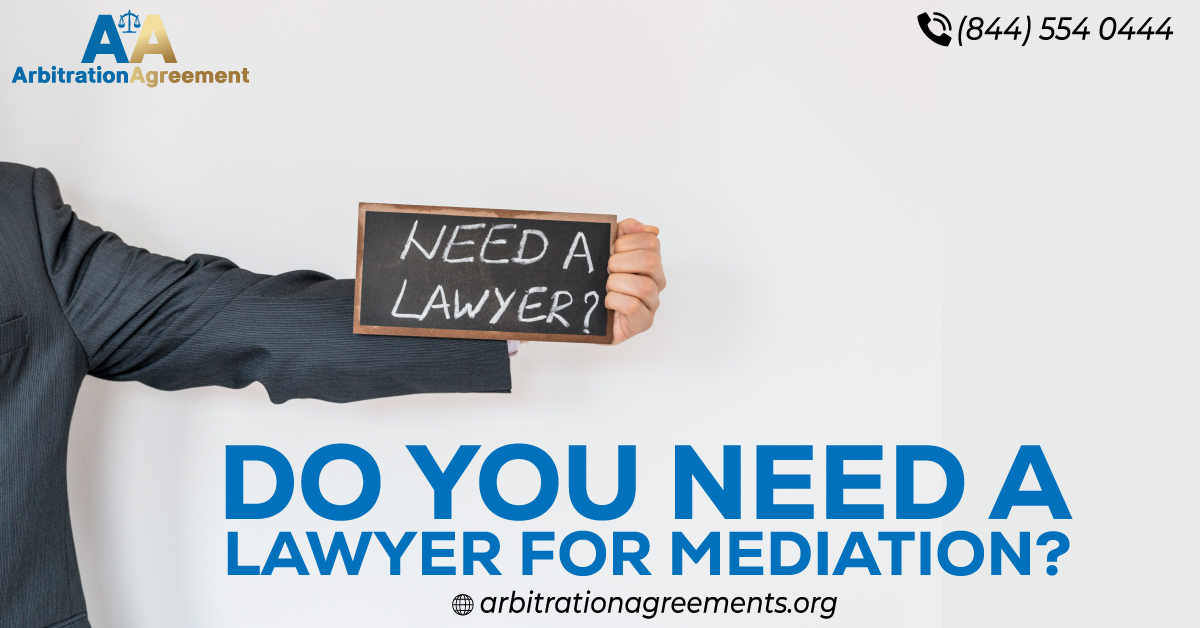Do You Need a Lawyer for Mediation? Unpacking the Pros and Cons
Nitin Paul Harmon
May 31, 2023, 11:35 a.m.
...
Nitin Paul Harmon
May 31, 2023, 11:35 a.m.
...
“Do you need a lawyer for mediation?” is a common and important question. Here is some key information to keep in mind:
Mediation is a process where a neutral third-party, known as a mediator, assists disputing parties in reaching a mutually acceptable resolution. Do you want to know what is the difference between arbitration and mediation? As a non-adversarial process that emphasizes cooperation and consensus over conflict, it can be a highly effective tool for resolving disputes outside of the courtroom.
One question that often arises when considering mediation is whether you need a lawyer. While it is not mandatory to have legal representation during mediation, the decision to involve a lawyer can depend on various factors such as the complexity of the issue, the financial stakes involved, and the comfort level of the parties in negotiating and understanding legal concepts.
Unlike a judge or an arbitrator, a mediator does not make decisions or impose solutions. Instead, they facilitate communication, help clarify issues, and guide parties towards a mutually agreeable resolution. Know how mediation defined? The emphasis in mediation is on self-determination, giving the parties control over the outcome.
A lawyer can play several roles in the mediation process. They can provide legal advice, help prepare for mediation, develop negotiation strategies, and review the terms of any proposed agreement. The lawyer can either represent a party during the mediation sessions, or they can act as a consultant outside of the sessions.

A variety of lawyers may have expertise in mediation, as it's a skill that cuts across many areas of law. Do you want to know who pays for mediation?? However, certain types of lawyers may be more likely to regularly engage in mediation due to the nature of their practice. Here are a few examples:
1. Family Lawyers: Family law disputes, including divorces, child custody, and spousal support, are often settled through mediation. Want to know arbitration clause & provision? This is because mediation can help preserve relationships and minimize the emotional toll on all parties involved, which is particularly crucial when children are involved. Therefore, many family lawyers have a deep understanding of mediation.
2. Employment Lawyers: Employment disputes, such as wrongful termination, harassment, or discrimination claims, can often be resolved through mediation. Employment lawyers, therefore, often have experience with mediation and understand how to effectively represent their clients in this setting.
3. Personal Injury Lawyers: Personal injury claims, including automobile accidents, slip-and-falls, and medical malpractice cases, often use mediation to reach settlements. Personal injury lawyers, therefore, often understand how to negotiate and mediate these types of disputes.
4. Business/Commercial Lawyers: Business disputes, including contract issues, partnership disagreements, and intellectual property disputes, can also be resolved through mediation. Lawyers specializing in business or commercial law, therefore, often have a good understanding of the mediation process.
5. Construction Lawyers: Construction law often involves complex disputes over contracts, work quality, delays, or payments. Mediation can be a cost-effective and efficient way to resolve these disputes, so construction lawyers often understand and use mediation.
6. Mediation or Alternative Dispute Resolution (ADR) Lawyers: Some lawyers specialize in mediation or ADR. They understand not only the legal aspects of various disputes but also the dynamics of negotiation and conflict resolution. They may act as mediators themselves, or they may represent clients in mediations.
No matter their specialty, a lawyer who understands mediation should have strong negotiation skills, patience, excellent communication skills, a deep understanding of the law relevant to the dispute, and a commitment to resolving conflicts in a cooperative and non-adversarial manner. Do you want to know how non-binding arbitration works? They should also respect and promote the principles of mediation, including voluntary participation, confidentiality, neutrality, and self-determination.
Lawyers can acquire mediation training through several avenues, each providing them with the skills and knowledge necessary to effectively mediate disputes or represent clients in mediation. Learn more about arbitration definition economics. Here's an overview of where lawyers typically receive mediation training:
When choosing a mediation training program, lawyers should consider the content of the program, the experience and qualifications of the trainers, the training methods used (for example, whether the program provides opportunities for role-playing or other forms of hands-on learning), and whether the program is recognized by relevant professional bodies.
It's also worth noting that the requirements for serving as a mediator can vary, so lawyers should ensure that any training program they choose meets the standards set by their jurisdiction or the organization they wish to mediate for.
The decision to involve a lawyer in mediation depends on several factors. These include the complexity of the dispute, the amount at stake, the balance of power between the parties, the emotional dynamics, and the parties' knowledge and comfort level with legal issues.
In complex disputes or when significant assets are at stake, legal advice can be invaluable. Know how arbitration vs litigation is a common dispute resolution talking point. If there is a significant power imbalance, a lawyer can help level the playing field. However, in simpler disputes, or where the parties have a good understanding of the issues and a balanced power dynamic, they might choose to proceed without lawyers.
Even if you decide not to have a lawyer represent you in the mediation, you might consider consulting with a lawyer before and after the mediation. More about arbitration & the types of arbitration. They can provide advice, help you prepare, and review any proposed agreements.